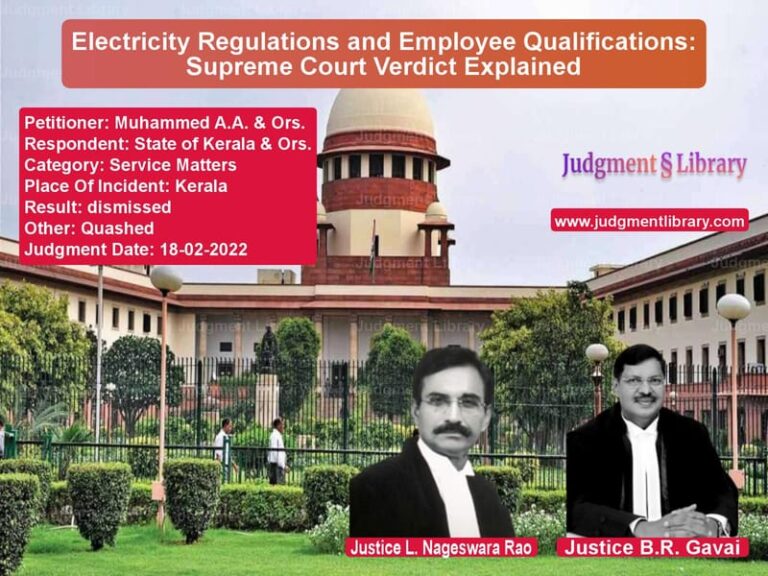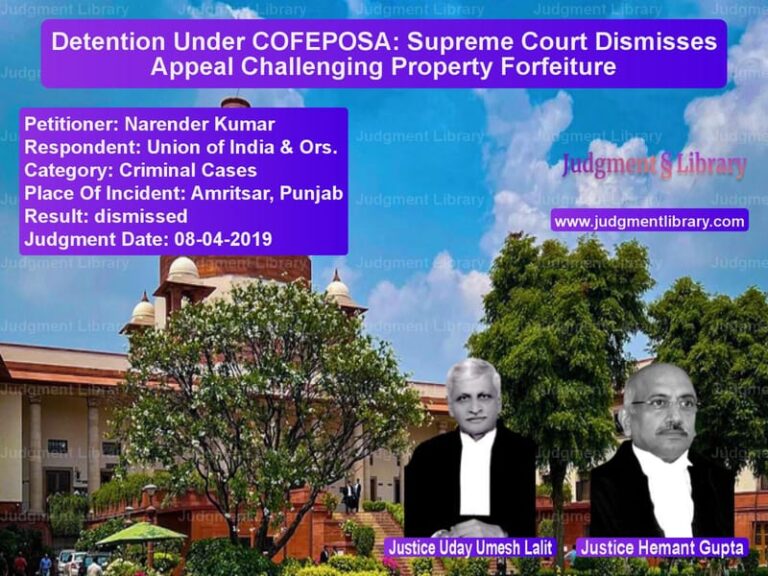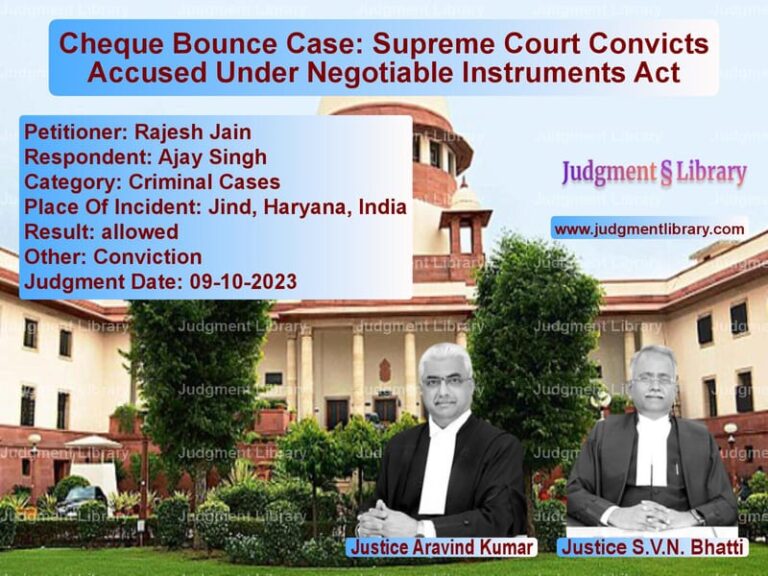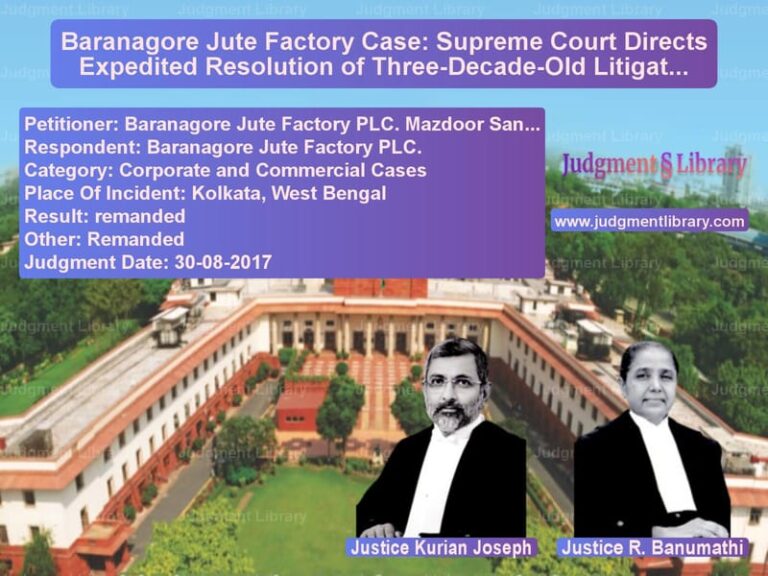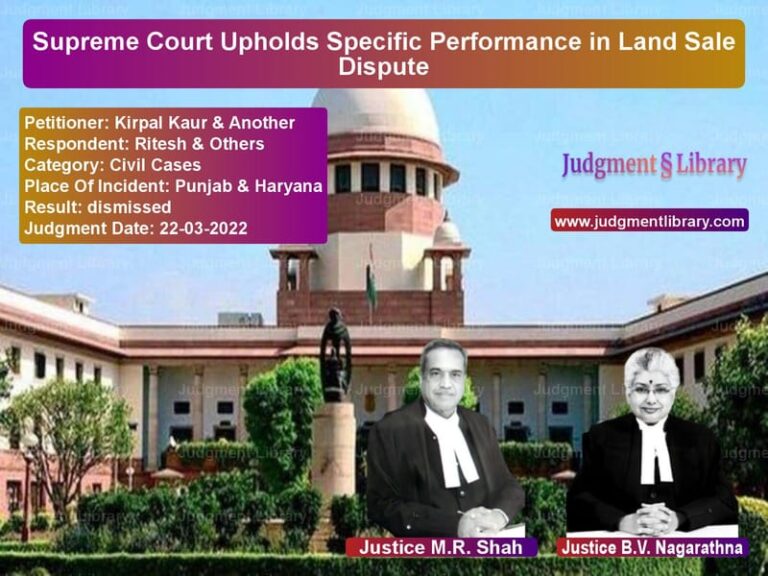Demurrage Charges and Importer Liability: Supreme Court’s Ruling in M/S. Rasiklal Kantilal & Co. v. Board of Trustees of Port of Bombay
Introduction
The case of M/S. Rasiklal Kantilal & Co. v. Board of Trustees of Port of Bombay & Others revolves around a dispute over demurrage charges imposed on imported goods stored at the Bombay Port. The Supreme Court examined the liability of an importer in paying demurrage, particularly when customs clearance was delayed due to circumstances beyond the importer’s control. This case is crucial in clarifying the responsibility of port authorities, shipping agents, and importers in the event of cargo delays.
Demurrage charges are levied by port authorities when goods remain uncleared beyond the free storage period. The crux of this case was whether an importer who acquires goods after they have been stored at the port should be liable for past demurrage charges.
Background of the Case
The dispute arose from the importation of zinc ingots and copper iron bars shipped to India between November 1991 and January 1992. These shipments were imported by various consignees from M/s Metal Distributors (UK) Ltd.. Upon arrival, the consignees failed to clear the goods, resulting in prolonged storage at Bombay Port.
The goods were imported on a “Cash Against Documents” (CAD) basis, meaning the original consignees could only obtain title upon full payment. When they failed to do so, M/s Metal Distributors (UK) Ltd. sought alternative buyers, and the appellant, M/S. Rasiklal Kantilal & Co., agreed to purchase these shipments.
As a new purchaser, the appellant requested the customs authorities to amend the Import General Manifest (IGM) and transfer the goods into its name. While this was permitted for 41 consignments, 37 consignments remained in dispute. The appellant later secured a detention certificate, which under certain government guidelines could allow remission of demurrage charges. However, the Board of Trustees of the Port of Bombay still demanded demurrage of Rs. 2,81,67,333, of which Rs. 90,52,535 was remitted. The remaining Rs. 1,91,14,798 was demanded from the appellant.
Legal Issues Raised
- Is an importer who acquires title to goods at a later stage liable for past demurrage charges?
- Do customs clearance delays justify remission of demurrage charges?
- Should port authorities enforce demurrage even when the delay was not caused by the importer?
- Does the principle of equity allow the waiver of demurrage charges in specific cases?
Arguments by the Appellant (M/S. Rasiklal Kantilal & Co.)
- The appellant argued that it acquired title to the goods long after their arrival and should not be held liable for demurrage charges accrued before purchase.
- The customs authorities delayed clearance due to administrative hurdles, justifying full remission of demurrage charges.
- Port authorities granted complete remission of demurrage for another importer, M/s Gilt Pack, showing discriminatory treatment.
- Since the detention certificate was issued, the appellant should be fully exempt from demurrage.
Arguments by the Respondents (Board of Trustees of Port of Bombay & Others)
- Demurrage charges are linked to goods, not ownership. Thus, the appellant was liable for all charges after acquiring the goods.
- The appellant knew of the accumulated demurrage before purchase and should have accounted for it.
- Port authorities have the right to levy demurrage for delayed clearance, regardless of customs involvement.
- The remission granted to M/s Gilt Pack was under different circumstances and could not be used as a precedent.
Supreme Court’s Judgment
The Supreme Court ruled in favor of a partial relief for the appellant, setting aside the High Court’s ruling and directing the Board of Trustees to reconsider the remission request. The Court clarified:
“Demurrage is a charge levied for storage beyond the free period, and liability is attached to the goods, not just the owner.”
The Court further held:
“While the appellant is liable for demurrage post-acquisition, remission should be considered for the period during which clearance was delayed due to customs action.”
The Court ordered:
“The Board of Trustees is directed to reconsider the request for remission of demurrage and provide a reasoned decision.”
Analysis of the Judgment
The Supreme Court’s ruling clarifies several important principles:
- Demurrage charges apply regardless of ownership transfer. This reinforces the principle that delays in clearance, not ownership changes, determine liability.
- Equity in demurrage remission: The judgment allows remission when clearance is delayed due to government agencies.
- Discretion of port authorities: While ports have the right to charge demurrage, remission must be considered in justified cases.
Key Takeaways from the Judgment
- Importers must clear shipments promptly or risk demurrage charges.
- Demurrage charges accrue on goods, not on ownership.
- Remission is possible if customs authorities cause delays.
- Port authorities must fairly assess remission requests.
Implications of the Judgment
This ruling impacts multiple stakeholders:
- Importers must assess demurrage risks before acquiring goods.
- Shipping agents must clarify demurrage liability terms.
- Customs authorities must ensure efficient processing to avoid demurrage accrual.
- Port authorities must establish clear remission guidelines.
Conclusion
The Supreme Court’s ruling in M/S. Rasiklal Kantilal & Co. v. Board of Trustees of Port of Bombay reinforces the legal principle that demurrage charges apply to goods, not just owners. However, it also highlights the need for equity in remission decisions when delays occur due to customs authorities. By directing the port authority to reconsider remission, the ruling balances commercial obligations with procedural fairness.
Don’t miss out on the full details! Download the complete judgment in PDF format below and gain valuable insights instantly!
Download Judgment: MS. Rasiklal Kantil vs Board of Trustees of Supreme Court of India Judgment Dated 28-02-2017.pdf
Direct Downlaod Judgment: Direct downlaod this Judgment
See all petitions in Contract Disputes
See all petitions in Damages and Compensation
See all petitions in Consumer Rights
See all petitions in Judgment by J. Chelameswar
See all petitions in Judgment by Abhay Manohar Sapre
See all petitions in partially allowed
See all petitions in Remanded
See all petitions in supreme court of India judgments February 2017
See all petitions in 2017 judgments
See all posts in Civil Cases Category
See all allowed petitions in Civil Cases Category
See all Dismissed petitions in Civil Cases Category
See all partially allowed petitions in Civil Cases Category


